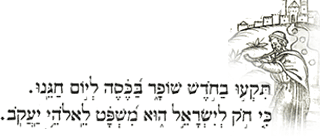|
Jewish Calendar - Tishrei / Rosh Hashanah / concealment


One
of the lesser known names attributed to Rosh Hashanah is Yom Hakeseh,
the Day of Concealment. This name is from Psalms 81:4-5, two verses that are
recited as part of the Rosh Hashanah liturgy:
of the Rosh Hashanah liturgy:
Sound
the shofar at the new moon, at the [keseh] concealed time for our feast day.
For this is a statue for Yisrael, an ordinance of the Good of Yaakov.
Many
translators of these verse have translated the Hebrew word keseh as "full
moon," creating a bit of confusion. Unlike most major Jewish festivals
which fall mid-month, on the 14th of the Hebrew month (when the moon is full
or near full), Rosh Hashanah falls on the first day of the month of Tishrei,
when the new moon may not yet have appeared.[1]
This is moon is thus a "concealed one."
The
nameYom Hakeseh, the Day of Concealment, has been given a number of interpretations.
|
•
|
In
the mystical writing of the Zohar, R. Elazar says: "On this day [Yom
Hakeseh, the Day of Concealment] the moon is covered, and it does
not shine until the tenth day, when Israel turns with a perfect repentance,
so that the supernal Mother gives light to her. Hence this day is called
the Day of Atonements (plural form, kippurim), because two lights
are shedding illumination, since the higher lamp is illuminating the lower.
For on this day, the moon receives illumination from the supernal Light,
and not from the light of the sun."[2]
|
|
•
|
The
People of Israel is symbolically compared to the moon and is radiant on
its Sabbaths and Festivals. On Rosh Hashanah, Israel diminishes itself and
conceals its greatness in awe of the Day of Judgment. |
|
•
|
The
Almighty, too, places a cover of concealment over His People's sins and
accords them forgiveness. |
|
•
|
All
that transpires on this day is characterized by concealment, and is applied
in the individual's behavior. Like a newborn with no past history in terms
of relations to others, no resentment, grudges, or unhappiness, we are instructed
to avoid anger, any expression of arrogance, or any negative thoughts, deeds,
or words; the hope is that concealment of the negative will lead to its
eradication, and to the cleansing of our souls.
|
Concealing
the sound of the shofar
The story is told of a certain Don Fernado Aguilar a conductor
of the Royal Orchestra in Barcelona after the Expulsion and forced conversion
of remaining Jews to Christianity. Aguilar organized a concert on the
eve of Rosh Hashanah and spread the word to the Marrano (forced convert)
community. During the concert the shofar was blown as part of
the performance. It was heard by all but appreciated only by some.
|
 |
[1]
According
to a "takanat chachamim," a rabbinical ordinance, Rosh Hashanah
can only fall on the second third or fifth day or the week or on Shabbat.
In Hebrew this characteristic of the first of Tishrei is noted by "Lo
A-D-U Rosh." [Back]
[2]
Zohar Emor 100b-101a
[Back]
|
TISHREI Table of Contents
|



